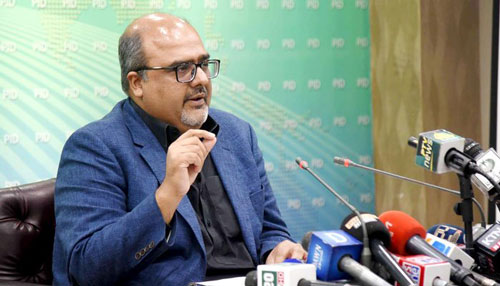Advisor to Prime Minister on Accountability and Interior Barrister Shehzad Akbar Friday said that Pakistan Muslim League-Nawaz (PML-N) President Shehbaz Sharif was the ring leader of the money-laundering gang as he and his son Hamza Shehbaz had been found involved in corruption and money-laundering of Rs 16 billion in Ramzan Sugar Mills case.
Addressing a press conference here, he said the challan submitted by the Federal Investigation Agency (FIA) against the two members of the Sharif family — Shehbaz Sharif and Hamza Shehbaz — in the Ramzan Sugar Mills money-laundering case consisted of more than 4,000 documents and 100 witnesses.
The National Accountability Bureau (NAB) also found Shehbaz Sharif involved in money-laundering and according to the FIA charge-sheet, he was the mastermind of the money-laundering group, he added.
He said the modus operandi used in the Hudaibiya Paper Mills case was again used in the Ramzan Sugar Mills. He said that Shehbaz Sharif got relief in the Hudaibiya Paper Mills case on technical grounds, not on merit.
Akbar said billions of rupees were laundered through the accounts of low-wage employees of Ramzan Sugar Mills. Shehzad Akbar said Shehbaz Sharif opened 28 ‘benamidar’ [fake] accounts for money laundering between 2008 and 2018, which was the tenure of his chief ministership in Punjab. He said the salary certificates of those employees were part of the bank record under the ‘know your customer (KYC)’ regime.
The PM advisor said the employees also confessed during investigation that the bank accounts were opened in their names and the cheque books and other belongings were taken over from them. He said the account opening was a condition after getting a job at the sugar mill.
Akbar said the amount of Rs 16 billion was deposited in the accounts by ‘karyana’ merchants, schoolteachers, hardware shops, auto-parts dealers, chicken suppliers, etc. He said that the FIA came to know from the account holders during investigation that none of them paid anything to the Sharif group.
The same method to launder money was also used in Sindh. The salaries of the employees varied between Rs 5,000 and 30,000; however, the transactions in the accounts were worth billions of rupees.
He said a cheque worth Rs 5 million was deposited in the account of peon Gulzar Ahmed through a man named Aurangzeb Butt.
The total transactions done in the account were worth over Rs 1 billion, adding that the salary of Aurangzeb Butt was around Rs 10,000 only.
He said Aurangzeb Butt confessed in an interview at a television programme that he gave that money in the party fund. However, Akbar said the question was how the money given for the party fund went into the account of a peon.
Masroor Anwar, who was a suspect in the case and a personal cashier of Shehbaz Sharif, withdrew this money and deposited it in accounts of Shehbaz Sharif and Hamza Shehbaz, he said.
He said peon Malik Maqsood had seven accounts and transactions worth Rs 3.7 billion were done in it while transactions worth over Rs 1.7 billion were carried out from the account of cashier Aslam.
He added that peon Gulzar Ahmed died in 2015; however, the transactions continued and Masroor Anwar kept withdrawing the money until 2017-2018. He said all ‘benamidar’ [fake] accounts were shut down when Shehbaz Sharif’s tenure as the chief minister ended.
He added that the FIA had submitted challan and the charge-sheeting process would begin from the next hearing.
To a question, he said people of the country wanted that such big cases of corruption and money laundering should be decided and justice should be done without lingering the proceedings.
The PTI government was committed to holding the corrupt accountable and it was taking all-out steps in that regard; however, support of other stakeholders was necessary to achieve the objective, he added.
The corruption has roots in every field; however, all stakeholders and departments including the opposition parties, judiciary and media, etc., should work together to end the menace of corruption from the country.










